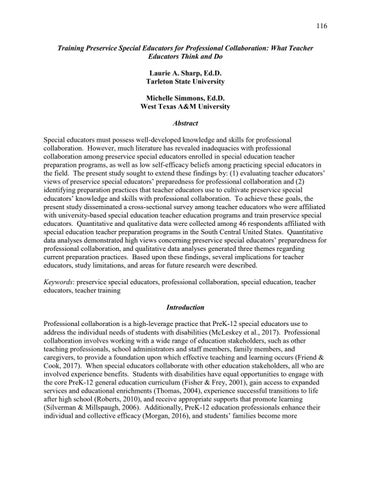116 Training Preservice Special Educators for Professional Collaboration: What Teacher Educators Think and Do Laurie A. Sharp, Ed.D. Tarleton State University Michelle Simmons, Ed.D. West Texas A&M University Abstract Special educators must possess well-developed knowledge and skills for professional collaboration. However, much literature has revealed inadequacies with professional collaboration among preservice special educators enrolled in special education teacher preparation programs, as well as low self-efficacy beliefs among practicing special educators in the field. The present study sought to extend these findings by: (1) evaluating teacher educators’ views of preservice special educators’ preparedness for professional collaboration and (2) identifying preparation practices that teacher educators use to cultivate preservice special educators’ knowledge and skills with professional collaboration. To achieve these goals, the present study disseminated a cross-sectional survey among teacher educators who were affiliated with university-based special education teacher education programs and train preservice special educators. Quantitative and qualitative data were collected among 46 respondents affiliated with special education teacher preparation programs in the South Central United States. Quantitative data analyses demonstrated high views concerning preservice special educators’ preparedness for professional collaboration, and qualitative data analyses generated three themes regarding current preparation practices. Based upon these findings, several implications for teacher educators, study limitations, and areas for future research were described. Keywords: preservice special educators, professional collaboration, special education, teacher educators, teacher training Introduction Professional collaboration is a high-leverage practice that PreK-12 special educators use to address the individual needs of students with disabilities (McLeskey et al., 2017). Professional collaboration involves working with a wide range of education stakeholders, such as other teaching professionals, school administrators and staff members, family members, and caregivers, to provide a foundation upon which effective teaching and learning occurs (Friend & Cook, 2017). When special educators collaborate with other education stakeholders, all who are involved experience benefits. Students with disabilities have equal opportunities to engage with the core PreK-12 general education curriculum (Fisher & Frey, 2001), gain access to expanded services and educational enrichments (Thomas, 2004), experience successful transitions to life after high school (Roberts, 2010), and receive appropriate supports that promote learning (Silverman & Millspaugh, 2006). Additionally, PreK-12 education professionals enhance their individual and collective efficacy (Morgan, 2016), and students’ families become more
Special Education Research, Policy & Practice - 2021 Edition

Issuu converts static files into: digital portfolios, online yearbooks, online catalogs, digital photo albums and more. Sign up and create your flipbook.


